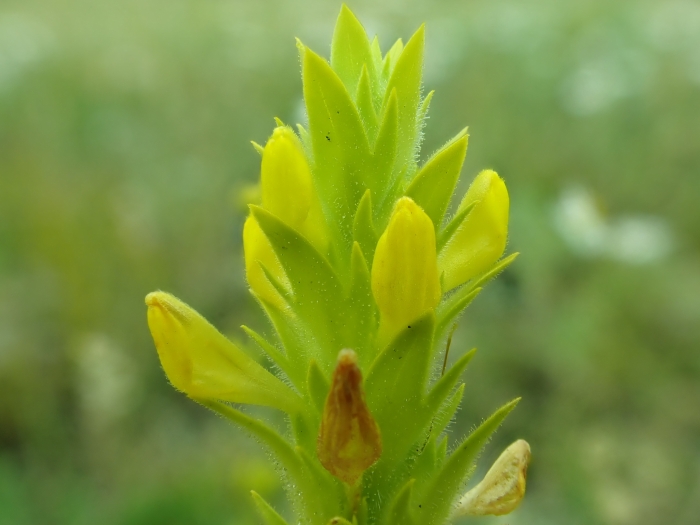Yellow Owl’s-Clover
(Orthocarpus luteus)
Yellow Owl’s-Clover (Orthocarpus luteus)
/
/

Matt Lavin
CC BY 4.0
Image By:
Matt Lavin
Recorded By:
Copyright:
CC BY 4.0
Copyright Notice:
Photo by: Matt Lavin | License Type: CC BY 4.0 | License URL: http://creativecommons.org/licenses/by/4.0/ | Rights Holder: Matt Lavin | Publisher: iNaturalist | Date Created: 2023-08-05T11:55:35-07:00 |

























Estimated Native Range
Summary
Orthocarpus luteus, commonly known as Yellow Owl’s-Clover, is an annual herb native to a variety of habitats including open grasslands, meadows, and the slopes of mountains in western and central North America. It typically grows to a slender height of up to 16 inches (40 cm) with narrow leaves that may be divided into three lobes. The plant’s most striking feature is its inflorescence, which consists of a dense cylindrical spike surrounded by green bracts and dotted with bright yellow, club-shaped flowers. The flowers, which bloom in late spring to early summer, have a small upper lip and a more pronounced narrow lower lip, and are quite showy when in full bloom.
Yellow Owl’s-Clover is valued for its vibrant yellow flowers that add a splash of color to wildflower gardens and meadow plantings. It is relatively easy to grow from seed and can be used to create a naturalistic setting. This plant prefers full sun to partial shade and thrives in well-drained soils. While it is drought-tolerant once established, it benefits from moderate watering during prolonged dry periods. It is not commonly associated with serious diseases or pests, but it can be susceptible to root rot if grown in poorly drained soils. Yellow Owl’s-Clover is not typically invasive, but it can self-seed prolifically under ideal conditions.CC BY-SA 4.0
Yellow Owl’s-Clover is valued for its vibrant yellow flowers that add a splash of color to wildflower gardens and meadow plantings. It is relatively easy to grow from seed and can be used to create a naturalistic setting. This plant prefers full sun to partial shade and thrives in well-drained soils. While it is drought-tolerant once established, it benefits from moderate watering during prolonged dry periods. It is not commonly associated with serious diseases or pests, but it can be susceptible to root rot if grown in poorly drained soils. Yellow Owl’s-Clover is not typically invasive, but it can self-seed prolifically under ideal conditions.CC BY-SA 4.0
Plant Description
- Plant Type: Herb
- Height: 0.5-1.5 feet
- Width: 0.5-1 feet
- Growth Rate: Rapid
- Flower Color: Yellow
- Flowering Season: Summer, Fall
- Leaf Retention:
Growth Requirements
- Sun: Full Sun, Part Shade
- Water: Low
- Drainage: Fast, Medium
Common Uses
Bird Garden, Butterfly Garden, Drought Tolerant, Low Maintenance
Natural Habitat
Open grasslands, meadows, and mountain slopes
Other Names
Common Names: Purple Owl’s Clover, Pink Tips, Golden-Tongue Owl-Clover, Yellow Owlclover, Golden-Tongue Owl’s-Clover, Exserted Indian Paintbrush
Scientific Names: , Orthocarpus luteus, Orthocarpus strictus,
GBIF Accepted Name: